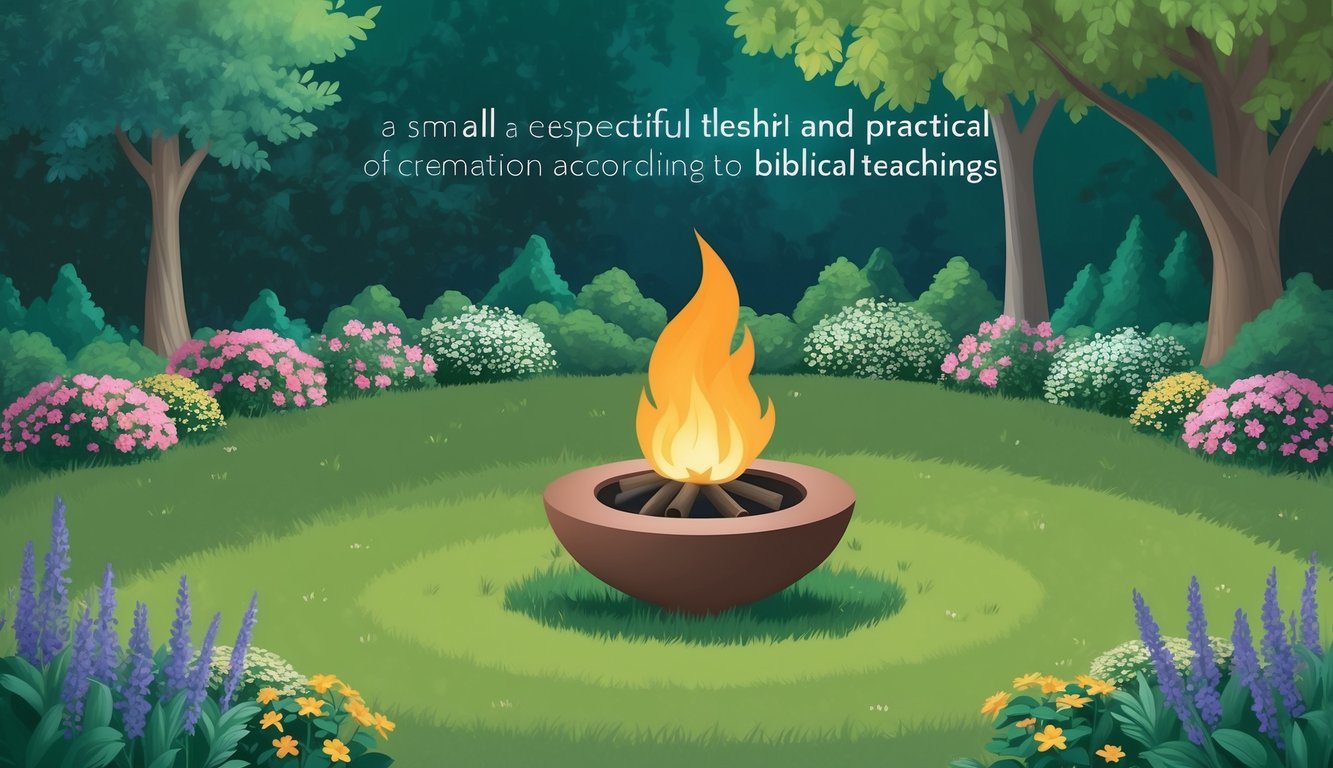Don’t Miss Out On This Unique Astrological Opportunity
Are you tired of spinning your wheels and getting nowhere? Simply put, you’re out of sync: you’re out of alignment with your astral configuration.
But: there’s a kind of map that can help you reclaim your alignment. Think of it as your own personal blueprint to success and happiness: a blueprint that will help you live your most amazing life.
Get started here.
Cremation is a topic often discussed among Christians, especially regarding how it aligns with biblical teachings.
While the Bible does not explicitly mention cremation, it has been a practice in various cultures throughout history.
Burial has traditionally been more common within Christian communities, but opinions differ on what the Bible suggests. The most important point is that the Bible does not explicitly prohibit cremation, allowing individuals and families to choose based on personal or spiritual beliefs.
In biblical times, burial was the typical method for honoring the dead, as seen in several stories throughout scriptures.
For example, the burial of Jesus and figures like Abraham and Sarah highlight this practice.
Yet, as cremation becomes more accepted in some Christian circles, the focus often shifts to the condition of the heart and faith rather than the method of interment.
Understanding the theological perspectives on cremation and burial can guide you in making informed decisions.
Some believe that cremation might conflict with traditional views of resurrection, while others emphasize respecting the deceased and their wishes.
Key Takeaways
- Burial has historical precedence in scripture.
- Bible doesn’t explicitly forbid cremation.
- Cremation choices can align with personal beliefs.
Biblical References to Burial and Cremation
Throughout the Bible, there are various references and practices regarding burial and cremation.
Traditional burial is mentioned more frequently, while instances of cremation are rare, yet significant.
Understanding these practices provides deeper insights into biblical narratives and customs.
In many biblical accounts, burial was the customary method of honoring the deceased, often signifying respect and hope in the resurrection.
While cremation did occur in certain cases, it was less common and sometimes associated with judgment or dishonor.
Similarly, discussions on other practices, such as what the Bible says about tattoos, reveal insights into cultural and religious beliefs that shaped biblical communities.
The Tradition of Burial in Scripture
In the Bible, burial is the most common way to honor the deceased.
This tradition reflects respect for the body and the belief in resurrection.
Key figures such as Abraham, Moses, and David were buried, which underscores the importance of this practice in biblical cultures.
Burial sites were often family plots, emphasizing familial connections even in death.
This practice can be seen in the burial of Sarah, Abraham’s wife, in the cave of Machpelah.
Such traditions highlight the focus on maintaining dignity and continuity after death.
Cremation Instances in the Bible
Instances of cremation in the Bible are not widespread but carry significant importance.
Cases appear where cremation was chosen under specific circumstances.
For example, cremation is mentioned in 1 Samuel 31 when the bodies of Saul and his sons were burned after their deaths in battle.
This act could be seen as a way to handle the defilement of the bodies and is not portrayed as a common practice.
The concept of ashes in general represents humility and repentance, often seen in biblical contexts like fasting or mourning.
Interpreting 1 Samuel 31 and Leviticus 20:14
1 Samuel 31 describes the cremation of Saul and his sons, addressing the aftermath of their tragic defeat.
This is one of the rare occasions of cremation and reflects urgent circumstances rather than a standard practice of that time.
Leviticus 20:14 mentions burning in the context of a punishment for grave sins, indicating cremation was associated with judgment in certain contexts.
While these examples might suggest a negative view, they are more about how specific situations were addressed rather than a blanket prohibition or endorsement of cremation.
Theological Perspectives on Cremation
The topic of cremation in relation to Christian theology involves complex considerations.
Key areas include how cremation aligns with beliefs about resurrection and personal choice based on faith.
Cremation and the Doctrine of Resurrection
Cremation raises questions about its compatibility with the doctrine of resurrection.
Christians often believe in a future physical resurrection, where God will raise the dead and give them new bodies.
The Bible mentions that the dead will rise, but different interpretations exist on how the body at death connects to this future event.
Some argue that cremation might conflict with this belief due to the literal destruction of the body.
Yet, others believe God’s power to resurrect is not limited by the physical condition of remains.
The idea is that, since God created the world, restoring a spiritual body is possible regardless of whether someone was buried or cremated.
The Belief in Bodily Resurrection
The belief in bodily resurrection is central to many Christians’ faith.
This belief holds that after death, believers will be physically resurrected with a new, imperishable body. Biblical references emphasize a future where the dead are resurrected, suggesting continuity between the earthly body and the new body.
Questions arise whether cremation affects this process.
Some traditions avoid the practice, maintaining a preference for burial to symbolize hope in resurrection.
However, the concept of spiritual body suggests transformation beyond just the physical remains, allowing flexibility in considering cremation.
Cremation as a Personal Decision
Choosing cremation can be seen as a personal decision influenced largely by individual beliefs and understanding of scriptures.
While some argue that cremation could affect one’s eternal destiny, the Bible does not provide a direct command regarding it.
In some places, cremation is common, with a preference based on practicality rather than theology.
Ultimately, individuals may weigh their beliefs about resurrection and cultural practices when considering cremation as an option.
Practical Considerations and Respect for the Deceased

When deciding between cremation and burial, several important factors come into play.
These include how the cremation process works, the traditions around respecting the body, and how personal choices can influence this decision.
Cremation Chamber Process
The cremation process begins in the cremation chamber.
This chamber reaches high temperatures to reduce the body to bones and ash.
This process typically takes a few hours.
After this, the remains, often called cremains, are processed to ensure a fine consistency.
Cremation offers a straightforward method of disposition and is often chosen for its simplicity and lower cost compared to traditional burial.
You should also be aware that some people question if cremation contradicts religious beliefs, although many denominations accept it today.
Proper Burial and Respect for the Body
Proper burial has been a time-honored method of showing respect for the deceased.
This process often involves rituals and ceremonies that reflect the love of God and honor the life of the person who has passed.
A key part of this tradition is maintaining respect for the body.
In Christian beliefs, ensuring the body is treated with care is paramount.
While some may worry that cremation disrespects the body, others view it as a different yet respectful approach.
Certain sources, like some sections of the book”, address these considerations.
The Role of Personal Preference in Choosing Cremation
Personal preference plays a significant role in choosing between cremation and burial.
Each individual or family might have reasons based on cultural, financial, or personal beliefs.
While some see traditional burial as an essential part of their faith, others might prefer cremation for its simplicity or environmental aspects.
You should weigh these choices carefully, as the decision often reflects personal or familial values rather than a strict religious rule.
Many modern perspectives support respecting both options, depending on personal circumstances and views.
Final Thoughts on Cremation and Eternal Destiny

When considering cremation in light of eternal destiny, it’s important to reflect on how it relates to core beliefs like salvation and the love of God.
The Bible does not explicitly forbid cremation, leaving you with the freedom to choose based on personal convictions and cultural practices.
Resurrection of the dead is a key element of Christian faith.
You may wonder how cremation affects this belief.
The focus is on God’s power to resurrect, whether buried or cremated.
The Bible emphasizes God’s omnipotence in bringing life from what seems lifeless.
Your eternal destiny relies not on the state of your body after death but on your faith and relationship with God.
The teachings of Jesus stress that eternal life is a gift of grace, offered through belief and trust in Him.
Keep in mind the comfort that the love of God provides.
Whether you choose burial or cremation, the assurance of His eternal love remains unshaken.
The decision should align with personal beliefs and the understanding that God values your heart and soul over physical remains.
Understanding these aspects can guide your decision on cremation, focusing more on spiritual truths than on the physical process.
Frequently Asked Questions

The Bible does not provide clear guidelines on cremation versus burial, leaving decisions open to personal interpretation.
Many Christians explore scriptural, theological, and historical views to guide their choices.
What are the Christian perspectives on cremation versus traditional burial?
Christian perspectives on cremation versus traditional burial vary widely.
Some believe burial honors the resurrection of Jesus and maintains tradition.
Others see cremation as a practical and acceptable choice.
Factors influencing these views include cultural practices and environmental concerns.
Is there an explicit verse in the King James Version of the Bible addressing cremation?
The King James Version of the Bible does not explicitly mention cremation.
Scripture provides no commandment or straightforward guidance, leading to varied personal and denominational interpretations.
Can you identify an individual who was cremated according to the Bible?
The Bible doesn’t specify any individual as having been cremated.
Throughout biblical narratives, burial is the more frequently mentioned practice.
Does Christianity traditionally favor burial over cremation, and why?
Traditionally, Christianity favors burial.
This preference is often linked to the belief in physical resurrection, which some feel is symbolically upheld through burial.
Burial is commonly viewed as reflecting the burial of Jesus Christ.
Does the state of one’s physical remains affect the soul’s journey after death in Christian belief?
Christian belief generally holds that the soul’s journey after death is not dependent on the body’s state.
The focus is more on one’s faith and spiritual life rather than physical remains, with the soul believed to reside with God after death.
What are the theological arguments used within the Christian faith to oppose cremation?
Opponents of cremation often cite the tradition of burial as representing the sanctity of the body and the hope of resurrection.
Some argue that burial reflects biblical customs.
They say that it aligns more closely with Christian theology and historical practice.



